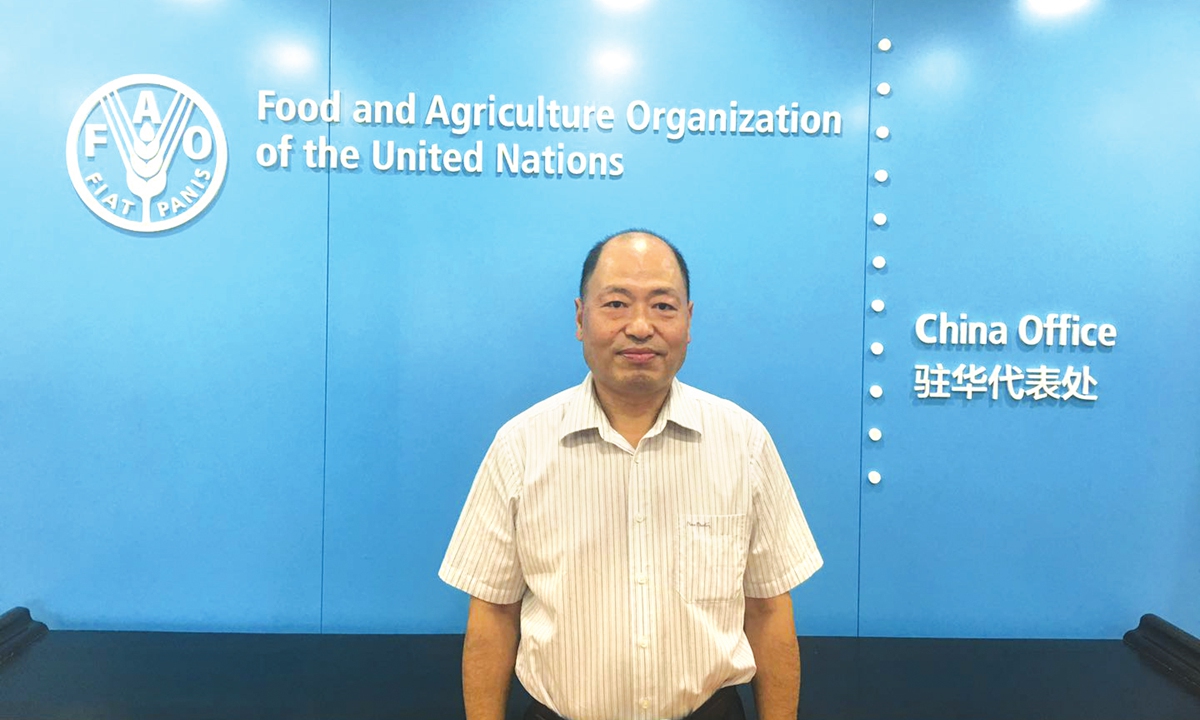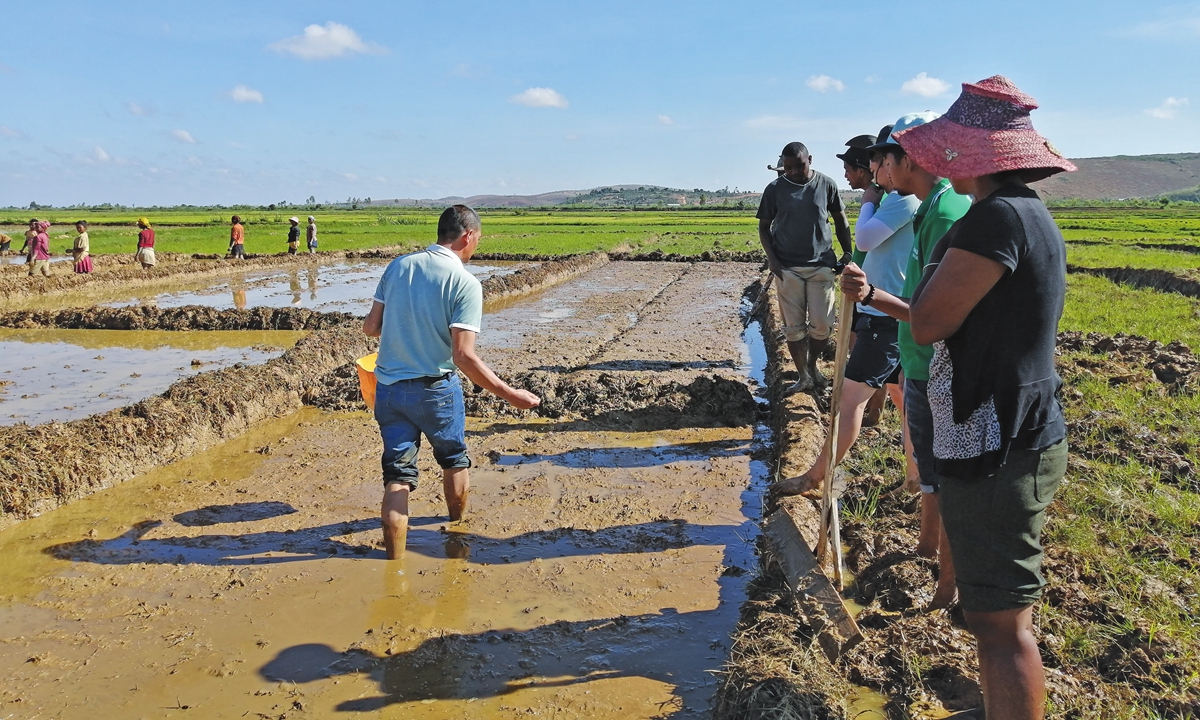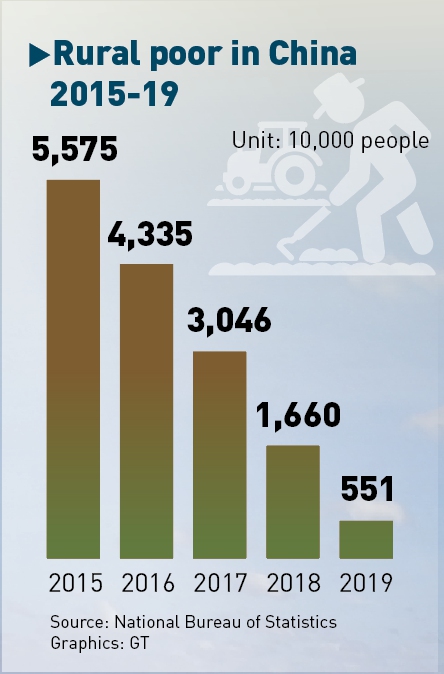China becoming an important development partner of FAO: official
By Dong Feng Source: Global Times Published: 2020/9/24 19:48:41
FAO and China have maintained a close partnership covering a broad scope of key areas, Zhang Zhongjun, assistant representative of the FAO China Office, told Global Times on Thursday.
Under the current country programming for China, more than 30 projects have been fielded into more than 20 provinces, said Zhang.
Since FAO's South-South Cooperation (SSC) Initiative was launched in 1996, the Chinese government has deployed more than 1,100 experts to 26 developing countries in Asia, Africa, and the Pacific and Caribbean islands. That is more than half of all FAO South-South experts.

Since FAO's South-South Cooperation (SSC) Initiative was launched in 1996, the Chinese government has deployed more than 1,100 experts to 26 developing countries in Asia, Africa, and the Pacific and Caribbean islands. That is more than half of all FAO South-South experts.
China was the first country to establish an SSC Strategic Alliance with FAO through a Letter of Intent signed in 2006. In 2008, China donated $30 million to establish the FAO-China SSC Trust Fund in support of improving world food security and sustainable agricultural development, marking China's entry into FAO's donor community.
Following the strong success of the first phase, China announced a second donation of $50 million to FAO in 2014 to continue supporting the SSC Initiative.
"In 2016, China and FAO signed a Memorandum of Understanding on Establishing a Comprehensive Strategic Cooperation Partnership and one of the priorities is SSC. These generous contributions and solemn commitments underline a much bigger role which China has come to play in the global arena today," Zhang said in a statement sent to the Global Times.
China is now expected to draw upon experiences and lessons learnt from the successful past collaboration, combine its strength with FAO to develop innovative and flexible modalities based on the demand-driven approach and explore opportunities for wider strategic partnerships to support other developing countries in eradicating hunger and achieving the Sustainable Development Goals (SDGs), he said.
Joint implementation
Zhang mentioned FAO has worked with the Chinese and Malagasy governments to jointly implement the SSC project in Madagascar for two years from 2019 to 2021.
In 2019, China fielded nine partners to Madagascar, where they have been worked closely with their host government counterparts to conduct technical assistance, he introduced.
This project aims to increase production, productivity and agricultural profitability by supporting programs implemented by the host country and FAO's Country Programming Framework. It is expected to contribute to Madagascar's food security, boost household incomes and achieve self-sufficiency, as well as promote investment, agribusiness and trade.
Hybrid rice production, livestock and agribusiness are Madagascar's selected priority areas. China has developed strong expertise and technologies in these areas that could be adapted to Madagascar's situation. To this effect, Chinese experts engaged in the main producing regions of Madagascar have worked with farmers and their organizations, as well as civil servants, residential technicians and research institutions. A demonstration on forage crops resulted in a tenfold yield increase with the use of Chinese technologies.
It is expected at least 1,000 farmers will be trained in socio-organizational and entrepreneurial capacities. A demonstration on forage crops resulted in a tenfold yield increase with the use of Chinese new techniques and technologies.

Clean Your Plate campaign
The Clean Your Plate campaign initiated by China echoes FAO's initiative to raise the social awareness of reducing food waste, Zhang stressed.
The campaign is meant to reshape people's dining behavior to save food during meals. Reducing food loss and waste has been a consistent priority of the Chinese government. China's re-iteration of its stance on reducing food wastage through echoes FAO priorities.
FAO decided to celebrate the first-ever observance of the International Day of Awareness of Food Loss and Waste on Tuesday. It comes during the global COVID-19 pandemic that awakened in many the need to transform and rebalance food production and consumption patterns. Critical action is necessary on a global and local level to prevent food
As a public intervention seeking to reduce food losses and waste, especially at this critical time, this campaign is not just an approach for reducing less and saving more, but also a catalyst for transitioning to a food system with food savers, which will enhance sustainability for the people and for the planet, he noted.

Poverty alleviation
Zhang finds that China's experience in poverty alleviation is exemplary for the world.
China has achieved remarkable progress regarding poverty alleviation, having lifted over 850 million people out of extreme poverty over the past 40 years. China's achievements have been the result of the government's strong leadership and the mobilization of massive resources and innovative practices, Zhang said.
During the COVID-19 pandemic, innovative practices applied with internet communication technologies, blockchain technologies and big data analysis helped avoid shortages and promote social-distancing, and maintain food safety and supply chains. Such solutions allowed farmers, consumers, and business owners to lose less and stay above the poverty line.
China had already begun exporting lessons of its own achievements in fighting hunger and rural poverty to other developing countries two decades ago. China has supported agricultural and rural development in other countries, working in a wide range of technical areas, including irrigation, aquaculture, and agroforestry.
As an important partner and collaborator to China, FAO is also facilitating poverty alleviation. Since 2017, FAO has collaborated with China Internet Information Center (CIIC), International Poverty Reduction Center in China (IPRCC), the World Bank, the Asian Development Bank (ADB), International Fund for Agricultural Development (IFAD), and World Food Program (WFP) on knowledge sharing to promote global poverty reduction.
The annual International Seminar on Global Poverty Reduction Partnerships in Rome and China Poverty Reduction International Forum in Beijing, have become cooperation modalities since 2017, he said.
Under the current country programming for China, more than 30 projects have been fielded into more than 20 provinces, said Zhang.
Since FAO's South-South Cooperation (SSC) Initiative was launched in 1996, the Chinese government has deployed more than 1,100 experts to 26 developing countries in Asia, Africa, and the Pacific and Caribbean islands. That is more than half of all FAO South-South experts.

Zhang Zhongjun, assistant representative of the FAO China Office Photo: Courtesy of the FAO China Office
Since FAO's South-South Cooperation (SSC) Initiative was launched in 1996, the Chinese government has deployed more than 1,100 experts to 26 developing countries in Asia, Africa, and the Pacific and Caribbean islands. That is more than half of all FAO South-South experts.
China was the first country to establish an SSC Strategic Alliance with FAO through a Letter of Intent signed in 2006. In 2008, China donated $30 million to establish the FAO-China SSC Trust Fund in support of improving world food security and sustainable agricultural development, marking China's entry into FAO's donor community.
Following the strong success of the first phase, China announced a second donation of $50 million to FAO in 2014 to continue supporting the SSC Initiative.
"In 2016, China and FAO signed a Memorandum of Understanding on Establishing a Comprehensive Strategic Cooperation Partnership and one of the priorities is SSC. These generous contributions and solemn commitments underline a much bigger role which China has come to play in the global arena today," Zhang said in a statement sent to the Global Times.
China is now expected to draw upon experiences and lessons learnt from the successful past collaboration, combine its strength with FAO to develop innovative and flexible modalities based on the demand-driven approach and explore opportunities for wider strategic partnerships to support other developing countries in eradicating hunger and achieving the Sustainable Development Goals (SDGs), he said.
Joint implementation
Zhang mentioned FAO has worked with the Chinese and Malagasy governments to jointly implement the SSC project in Madagascar for two years from 2019 to 2021.
In 2019, China fielded nine partners to Madagascar, where they have been worked closely with their host government counterparts to conduct technical assistance, he introduced.
This project aims to increase production, productivity and agricultural profitability by supporting programs implemented by the host country and FAO's Country Programming Framework. It is expected to contribute to Madagascar's food security, boost household incomes and achieve self-sufficiency, as well as promote investment, agribusiness and trade.
Hybrid rice production, livestock and agribusiness are Madagascar's selected priority areas. China has developed strong expertise and technologies in these areas that could be adapted to Madagascar's situation. To this effect, Chinese experts engaged in the main producing regions of Madagascar have worked with farmers and their organizations, as well as civil servants, residential technicians and research institutions. A demonstration on forage crops resulted in a tenfold yield increase with the use of Chinese technologies.
It is expected at least 1,000 farmers will be trained in socio-organizational and entrepreneurial capacities. A demonstration on forage crops resulted in a tenfold yield increase with the use of Chinese new techniques and technologies.

Chinese experts dispatched by the FAO-China South-South Cooperation Program give training on hybrid rice planting in Madagascar in 2019. Photo: Courtesy of the FAO China Office
Clean Your Plate campaign
The Clean Your Plate campaign initiated by China echoes FAO's initiative to raise the social awareness of reducing food waste, Zhang stressed.
The campaign is meant to reshape people's dining behavior to save food during meals. Reducing food loss and waste has been a consistent priority of the Chinese government. China's re-iteration of its stance on reducing food wastage through echoes FAO priorities.
FAO decided to celebrate the first-ever observance of the International Day of Awareness of Food Loss and Waste on Tuesday. It comes during the global COVID-19 pandemic that awakened in many the need to transform and rebalance food production and consumption patterns. Critical action is necessary on a global and local level to prevent food
As a public intervention seeking to reduce food losses and waste, especially at this critical time, this campaign is not just an approach for reducing less and saving more, but also a catalyst for transitioning to a food system with food savers, which will enhance sustainability for the people and for the planet, he noted.

Poverty alleviation
Zhang finds that China's experience in poverty alleviation is exemplary for the world.
China has achieved remarkable progress regarding poverty alleviation, having lifted over 850 million people out of extreme poverty over the past 40 years. China's achievements have been the result of the government's strong leadership and the mobilization of massive resources and innovative practices, Zhang said.
During the COVID-19 pandemic, innovative practices applied with internet communication technologies, blockchain technologies and big data analysis helped avoid shortages and promote social-distancing, and maintain food safety and supply chains. Such solutions allowed farmers, consumers, and business owners to lose less and stay above the poverty line.
China had already begun exporting lessons of its own achievements in fighting hunger and rural poverty to other developing countries two decades ago. China has supported agricultural and rural development in other countries, working in a wide range of technical areas, including irrigation, aquaculture, and agroforestry.
As an important partner and collaborator to China, FAO is also facilitating poverty alleviation. Since 2017, FAO has collaborated with China Internet Information Center (CIIC), International Poverty Reduction Center in China (IPRCC), the World Bank, the Asian Development Bank (ADB), International Fund for Agricultural Development (IFAD), and World Food Program (WFP) on knowledge sharing to promote global poverty reduction.
The annual International Seminar on Global Poverty Reduction Partnerships in Rome and China Poverty Reduction International Forum in Beijing, have become cooperation modalities since 2017, he said.
RELATED ARTICLES:
- FAO chief calls for action to improve food security in Africa
- FAO Food Price Index rises for fifth straight month, dairy prices main driver again
- FAO strengthens southern African countries to fight crop pest outbreak
- FAO says climate change main challenge to meeting food needs as world population grows
Posted in: DIPLOMATIC CHANNEL